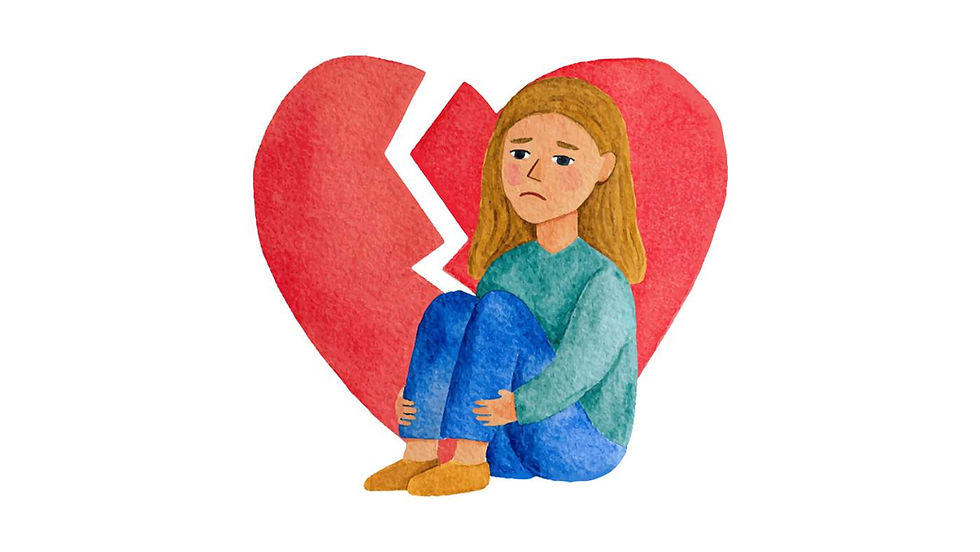Is It Trauma or Just Stress? How to Know When It’s Time to Talk to Someone
- May 19, 2025
- 3 min read

For teens and young adults wondering why they feel “off” all the time.
You’re exhausted. You’re overthinking every text. You snap at people you care about—or disappear completely. You keep saying you’re “fine,” but deep down, something feels off.
Maybe you’ve wondered:“Am I just stressed out… or is this something deeper?”You’re not alone—and asking this question is actually a really important step.
Let’s break down the difference between stress and trauma, and how to know when it might be time to talk to someone who gets it.
Stress vs. Trauma: What's the Difference?
Stress is a normal response to life’s demands. It’s short-term, usually linked to something specific (exams, friend drama, breakups), and your body tends to bounce back once things settle down.
Trauma is deeper. It’s what happens when your brain gets overwhelmed and can’t fully process what’s happening. That “thing” might be big and obvious (a car accident, a toxic relationship), or it might be something that’s happened slowly over time—like constantly feeling not good enough, being emotionally ignored, or dealing with unpredictable parents.
Stress = a moment
Trauma = a pattern or wound that sticks around
But here’s the thing: your body doesn’t care about definitions. If you’re constantly feeling unsafe, overwhelmed, or disconnected, your nervous system might already be showing signs of trauma—whether or not you call it that.
Signs It Might Be Trauma (Not Just Stress)
Here are a few signs what you’re experiencing might go deeper than just “a rough week”:
You’re always on edge—even when things seem fine
You avoid certain people, places, or conversations
You feel numb or disconnected, like you're watching your life instead of living it
Your moods change fast, and you don’t know why
You overreact to little things or totally shut down
You’re constantly people-pleasing or trying to “keep the peace”
You replay past moments over and over, wishing you’d done something different
You feel like your body is tense all the time or you can’t sleep through the night
If you read this list and thought “Whoa… that’s me”—please know: you’re not broken. You’re just carrying something heavy that needs a safe place to land.
Trauma Isn’t Just About “What Happened”—It’s About How It Landed
Some people experience something painful and bounce back quickly. Others experience something that seems small but hits really hard.
What matters most is not whether something was “traumatic enough”—it’s how it impacted your ability to feel safe, connected, and in control.
That’s why therapy can be such a game changer.
What Happens When You Talk to a Trauma-Informed Therapist?
When you work with a trauma-informed therapist, you’re not just talking about what happened. You’re learning how to:
Understand your reactions (instead of judging yourself for them)
Feel your emotions without getting overwhelmed by them
Reconnect with parts of yourself that you’ve had to hide
Build confidence and trust in your body again
Set boundaries, say no, and show up for yourself—even when it’s hard
Not Sure If It’s “Bad Enough” for Therapy? Here’s a Tip.
If you’re wondering whether to reach out… you probably already have your answer.
Therapy isn’t just for people who’ve “hit rock bottom.” It’s for anyone who wants to feel less stuck, more clear, and more in control of their life.
And you deserve that.
Ready to Talk to Someone Who Gets It?
If you’re a teen or young adult in Scarsdale, Westchester, or anywhere in NY I offer both in-person and online therapy. I will meet you wherever you are—with zero judgment and real tools that will provide you relief from carrying too much for too long.
Book a free consultation to get started.
About our Scarsdale Therapist Sonia Gonzalez

Sonia Gonzalez is a licensed mental health counselor (LMHC) at Peaceful Living Mental Health Counseling in Scarsdale, NY.
Sonia specializes in supporting teens and adults navigating anxiety, depression, grief, life transitions, and self-esteem challenges using CBT, DBT, and psychodynamic approaches.
She creates a warm, supportive space where clients feel heard and empowered to build resilience and gain emotional clarity.




Khi xem qua một vài chia sẻ gần đây, mình để ý thấy Jun 88 nên tò mò ghé vào xem thử. Mình chỉ dành chút thời gian xem cách bố trí và trình bày tổng thể chứ chưa đọc kỹ nội dung. Ấn tượng ban đầu là trang được sắp xếp khá hợp lý, nhìn chung gọn gàng và dễ theo dõi.
Sometimes it’s hard to tell if what you’re feeling is just everyday stress or something deeper, like unresolved trauma. I’ve learned that ignoring the signs can make things heavier over time. Talking to a professional really helped me sort through my thoughts and understand myself better. That’s why finding the right psychiatrist matters psychiatrist in brooklyn ny — someone who not only listens but also makes the process convenient and supportive. With the right care, you can focus on your goals for mental health and finally feel like you’re moving forward, not just coping.